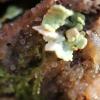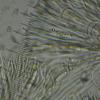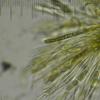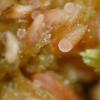
26-02-2026 15:00
Me mandan el material seco de Galicia, recolectada

24-02-2026 11:01
Gernot FriebesHi,found on a branch of Tilia, with conidia measur

23-02-2026 11:22
Thomas Læssøehttps://svampe.databasen.org/observations/10584971

29-11-2024 21:47
Yanick BOULANGERBonjourJ'avais un deuxième échantillon moins mat

07-02-2023 22:28
Ethan CrensonHello friends, On Sunday, in the southern part of

19-02-2026 17:49
Salvador Emilio JoseHola buenas tardes!! Necesito ayuda para la ident

19-02-2026 13:50
Margot en Geert VullingsWe found this collection on deciduous wood on 7-2-
Pink on mosses
Marja Pennanen,
21-10-2012 13:26
I have found pink ascos on mosses ealier and many times last weeks.
I mean Belonioscyphella pluriseptata.
Some days ago I however found something else on dying Sphagnum.
These are about 0,2-0,3 mm wide.
The spores are about 9-15x3-5, propably 4/ascus, which seems IKI-.
The asci are about 50-60x5-6 (10 sometimes when two spores are side by side).
The paraphyses are a bit swollen at tips, about 2 micrometers wide and many.
Roseodiscus?
Marja
Wolfgang von Brackel,
21-10-2012 13:36
Re : Pink on mosses
This looks very much like Absconditella sphagnorum Vezada & Poelt, a lichenized species. You should look if it is connected with algae.
Wolfgang
Wolfgang
Marja Pennanen,
21-10-2012 17:21
Re : Pink on mosses
Hi Wokfgang,
Thank you for your comment.
I've been told, that lichenized species tend to have asci, that turn blue in Meltser.
Can the reaction be similar in IKI, too?
I saw no blue colours in IKI.
The spores may have a septum and so the microscophy is about similar to the description of Absconditella sphagnorum, when it was finally found from internet.
Just that I can't remember the fruitbodies to be concave. Should check that.
Marja
Thank you for your comment.
I've been told, that lichenized species tend to have asci, that turn blue in Meltser.
Can the reaction be similar in IKI, too?
I saw no blue colours in IKI.
The spores may have a septum and so the microscophy is about similar to the description of Absconditella sphagnorum, when it was finally found from internet.
Just that I can't remember the fruitbodies to be concave. Should check that.
Marja
Wolfgang von Brackel,
21-10-2012 17:37
Re : Pink on mosses
Hi Marja,
in Absconditella the asci (mostly) do not react with iodine or Meltzers, so this is ok. What I see from your picture, the ascomata are quite concave. I think there is no doubt about Absconditella sphagnorum. I add a photo, but tit is rather difficult to take pictures of the species.
Wolfgang
in Absconditella the asci (mostly) do not react with iodine or Meltzers, so this is ok. What I see from your picture, the ascomata are quite concave. I think there is no doubt about Absconditella sphagnorum. I add a photo, but tit is rather difficult to take pictures of the species.
Wolfgang
Marja Pennanen,
22-10-2012 09:31
Re : Pink on mosses
Hi Wolfgang,
you are right. Tiny ones are hard to capture in photos.
When I look closely the one I took, the ascos are concave.
Thank you once again.
So, how to distinguish lichenized species?
The only separative detail I knew was just falsified...
Marja
you are right. Tiny ones are hard to capture in photos.
When I look closely the one I took, the ascos are concave.
Thank you once again.
So, how to distinguish lichenized species?
The only separative detail I knew was just falsified...
Marja
Wolfgang von Brackel,
24-10-2012 06:47
Re : Pink on mosses
Hi Marja,
sorry, I was in field. There are no general features to distinguish lichenized and non-lichenized species (as several genera include both, like in some Caliciales). You have to look if the hyphae are assoziated with algae. Usually a thallus of hyphae and algae is developed, but the assoziation may be also very loose.
Wolfgang
sorry, I was in field. There are no general features to distinguish lichenized and non-lichenized species (as several genera include both, like in some Caliciales). You have to look if the hyphae are assoziated with algae. Usually a thallus of hyphae and algae is developed, but the assoziation may be also very loose.
Wolfgang
Jan Eckstein,
26-10-2012 09:42
Re : Pink on mosses
Hello Marja,
your specimen looks like Absconditella sphagnorum. I recently found this species in a bog in Germany. You can find an image on Wikimedia commons:
http://commons.wikimedia.org/wiki/File:JE_9628_Absconditella_sphagnorum_180px_Stedlinger_Moor_Germany.jpg?
Any idea about the moos of your collection?
with best wishes
Jan
your specimen looks like Absconditella sphagnorum. I recently found this species in a bog in Germany. You can find an image on Wikimedia commons:
http://commons.wikimedia.org/wiki/File:JE_9628_Absconditella_sphagnorum_180px_Stedlinger_Moor_Germany.jpg?
Any idea about the moos of your collection?
with best wishes
Jan
Marja Pennanen,
26-10-2012 10:01
Re : Pink on mosses
Hi Jan,
you photo is fine. They are certainly concave!
My collection was not that generous.
I think. that they were growing on dying Sphagnum angustifolium.
Some years ago ditches had been cleaned and there were still some heaps of mosses left on that swamp.
Marja
you photo is fine. They are certainly concave!
My collection was not that generous.
I think. that they were growing on dying Sphagnum angustifolium.
Some years ago ditches had been cleaned and there were still some heaps of mosses left on that swamp.
Marja



